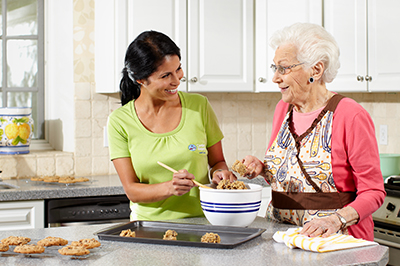More Coronavirus Resources:
Monday, July 17, 2017
Tough to Swallow
Proper nutrition plays a vital role in physical and emotional well-being at every point in life. However, for older adults, a consistent intake of healthy food and receiving essential nutrients can help reduce the risk of serious  conditions. Remove that from the equation, and a manageable situation can go south quickly. But what if even the mere act of swallowing food were to suddenly become a struggle? For many older adults, this is a startling reality.
conditions. Remove that from the equation, and a manageable situation can go south quickly. But what if even the mere act of swallowing food were to suddenly become a struggle? For many older adults, this is a startling reality.
Dysphagia, or difficulty swallowing, is a common age-related problem. Seniors may experience dysphagia for a variety of reasons, and generally the symptoms may include:
- Inability to get food and/or liquids down
- Pain when swallowing
- Chest pressure
- Frequent heartburn
- Gagging, choking, or coughing when swallowing
Symptoms of dysphagia can become more severe over time, and the severity may be largely contingent upon where the problem is occurring.
Oropharyngeal vs. Esophageal
Oropharyngeal dysphagia occurs when a person cannot swallow because of problems in the mouth or throat, as a result of any of the following:
- Nerve damage from a brain or spinal cord injury, stroke, Parkinson’s Disease, muscular dystrophy, or multiple sclerosis
- Tumors that obstruct the path of food
- Inflammatory or neuromuscular problems, such as dermatomyositis (an inflammatory disease) and myasthenia gravis
Esophageal dysphagia occurs later on in the swallowing process, when food is unable to move down the esophagus. Some of the causes include:
- A narrowing of the esophagus, also known as a stricture, which ultimately traps larger pieces of food. The esophagus narrows primarily because of scar tissue or tumors
- Gastroesophageal reflux disease, or GERD, can cause stomach acid to flow back into the esophagus, causing scarring
- Blockage caused by food not being chewed properly (especially for older adults who have problems chewing because of dentures)
Treatment and Management
As mentioned, dysphagia is one of the more common challenges faced by seniors. While normal wear and tear on the esophagus adds up over the years, aging adults are also more likely to experience many of the conditions or difficulties conducive to dysphagia. If your senior loved one is experiencing difficulty swallowing, he or she should consult a physician to determine what the larger problem may be.
For oropharyngeal dysphagia, doctors will likely recommend a combination of exercises (designed to help re-coordinate muscles used during swallowing) and speech therapy. Esophageal dysphagia may be more involved. If there is a stricture, a doctor may need to dilate the esophagus in order to expand its width. Surgery may also be required, in cases involving an esophageal tumor obstructing the pathway of food. For the more severe cases, doctors may recommend a liquid diet and feeding tube. This is especially advisable for those that have suffered a stroke, as the process of swallowing may remain a challenge for the foreseeable future.
For those that are currently working with a physician to understand the cause of their dysphagia but are still able to effectively swallow food, there are few things they can do to manage symptoms. For starters, if heartburn is one of the leading factors in dysphagia, eliminating tobacco, alcohol, and caffeine is imperative. In terms of diet, it may be a matter of determining which foods cause trouble and which ones go down easily. After establishing the safer foods, the focus should be controlling not only the size of food eaten, but also the rate of consumption. If larger pieces of food are eaten too quickly, it can make the symptoms of dysphagia that much more intolerable.
Comfort Keepers® Can Help
We can work with your loved ones’ physician and/or dietician to determine best practices for managing dysphagia. We can help prepare foods appropriate for the situation, as well as provide safe, dependable transportation to and from scheduled doctor’s appointments. Our goal, above all, is to help promote physical and emotional wellbeing. For more information, reach out to your local Comfort Keepers® today.
References:
Senior Health 365. “Difficulty Swallowing (Dysphagia) in the Elderly.” Web. 2017.
Web MD. “Difficulty Swallowing (Dysphagia) – Overview.” Web. 2017.
National Center for Biotechnology Information. “Dysphagia in the Elderly” by Muhammad Aslam and Michael F. Vaezi. Web. 2013.







